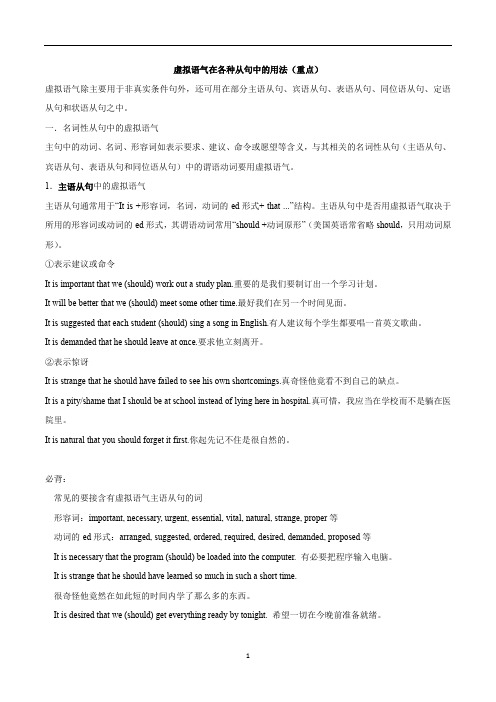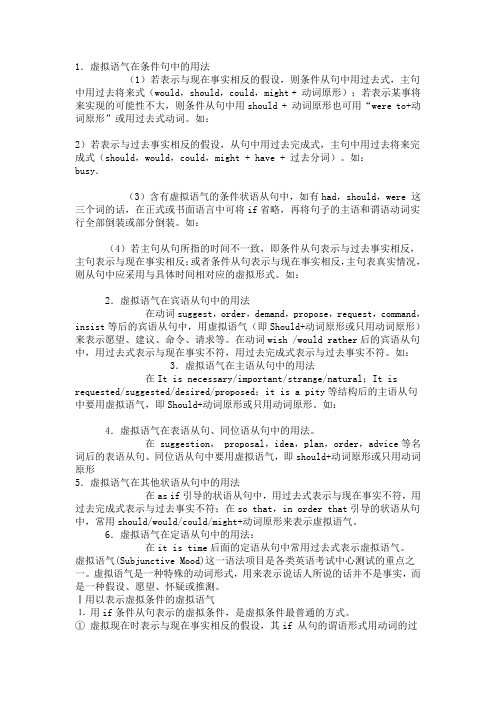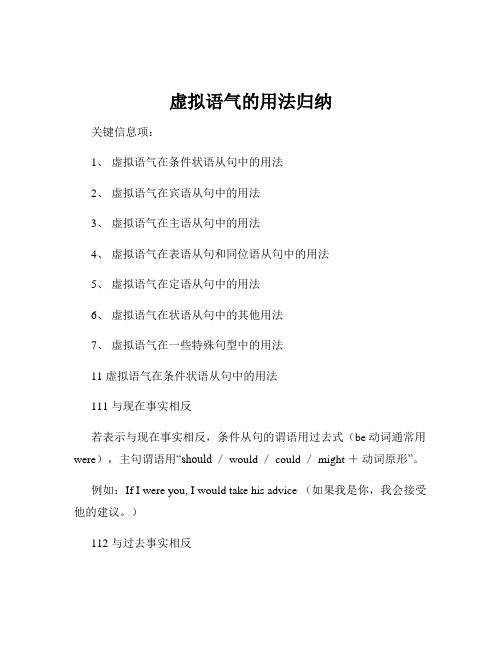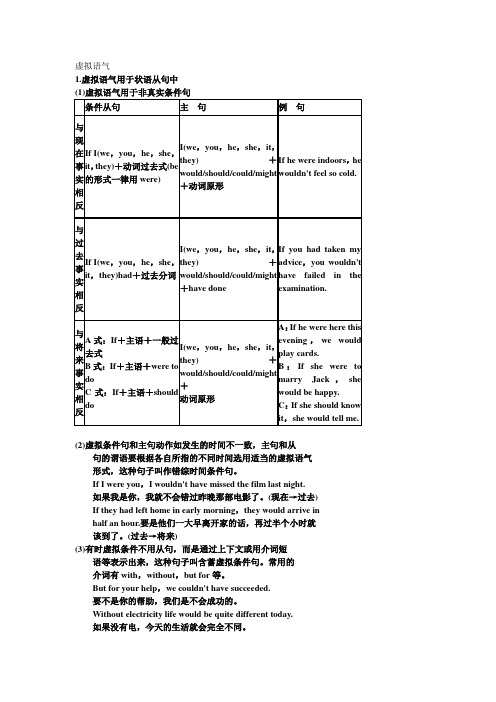虚拟语气在从句中的用法
高中英语从句在虚拟语气中用法

虚拟语气在各种从句中的用法(重点)虚拟语气除主要用于非真实条件句外,还可用在部分主语从句、宾语从句、表语从句、同位语从句、定语从句和状语从句之中。
一.名词性从句中的虚拟语气主句中的动词、名词、形容词如表示要求、建议、命令或愿望等含义,与其相关的名词性从句(主语从句、宾语从句、表语从句和同位语从句)中的谓语动词要用虚拟语气。
1.主语从句中的虚拟语气主语从句通常用于“It is +形容词,名词,动词的-ed形式+ that ...”结构。
主语从句中是否用虚拟语气取决于所用的形容词或动词的-ed形式,其谓语动词常用“should +动词原形”(美国英语常省略should,只用动词原形)。
①表示建议或命令It is important that we (should) work out a study plan.重要的是我们要制订出一个学习计划。
It will be better that we (should) meet some other time.最好我们在另一个时间见面。
It is suggested that each student (should) sing a song in English.有人建议每个学生都要唱一首英文歌曲。
It is demanded that he should leave at once.要求他立刻离开。
②表示惊讶It is strange that he should have failed to see his own shortcomings.真奇怪他竟看不到自己的缺点。
It is a pity/shame that I should be at school instead of lying here in hospital.真可惜,我应当在学校而不是躺在医院里。
It is natural that you should forget it first.你起先记不住是很自然的。
虚拟语气在宾语从句中的用法

虚拟语气在宾语从句中的用法虚拟语气在宾语从句中的用法主要是表示一种与事实相反或不可能实现的假设、愿望、建议、命令等。
常用的虚拟语气形式有虚拟条件状语从句的"if"引导的虚拟语气、愿望句型的虚拟语气以及建议、命令等句型的虚拟语气。
1.虚拟条件状语从句的"if"引导的虚拟语气:在宾语从句中,如果条件句表达的是不可能实现或与事实相反的情况,那么主句的谓语动词就可以采用虚拟语气来表达。
例如:- I wish he were here.(我希望他在这里。
)其中,"were"是虚拟语气的过去式形式,用于表示与现实相反的情况,即实际上他不在这里。
2.愿望句型的虚拟语气:在宾语从句中,如果表达的是一种渴望或愿望,而该愿望实际上是不太可能实现的,那么常常使用虚拟语气来表达。
例如:- I would rather you came tomorrow.(我希望你明天来。
)其中,"came"是虚拟语气的一种形式,用于表示与现实相反的情况,即实际上他未来。
3.建议、命令等句型的虚拟语气:在宾语从句中,如果主句是一个建议、命令等,而宾语从句所表示的内容是不可能实现或与事实相反的情况,那么主句的谓语动词也可以采用虚拟语气来表达。
例如:- The teacher asked that he not be late for class.(老师要求他不要迟到。
)其中,"be"是虚拟语气的一种形式,用于表示与现实相反的情况,即实际上他经常迟到。
虚拟语气在宾语从句中的使用可以使句子更丰富多样,并能够准确表达说话人的想法、意愿和假设。
但需要注意的是,虚拟语气用法的正确性与自然性需要根据具体情况和语境来判断。
虚拟语气用法大全

1.虚拟语气在条件句中的用法(1)若表示与现在事实相反的假设,则条件从句中用过去式,主句中用过去将来式(would,should,could,might + 动词原形);若表示某事将来实现的可能性不大,则条件从句中用should + 动词原形也可用“were to+动词原形”或用过去式动词。
如:2)若表示与过去事实相反的假设,从句中用过去完成式,主句中用过去将来完成式(should,would,could,might + have + 过去分词)。
如:busy.(3)含有虚拟语气的条件状语从句中,如有had,should,were 这三个词的话,在正式或书面语言中可将if省略,再将句子的主语和谓语动词实行全部倒装或部分倒装。
如:(4)若主句从句所指的时间不一致,即条件从句表示与过去事实相反,主句表示与现在事实相反;或者条件从句表示与现在事实相反,主句表真实情况,则从句中应采用与具体时间相对应的虚拟形式。
如:2.虚拟语气在宾语从句中的用法在动词suggest,order,demand,propose,request,command,insist等后的宾语从句中,用虚拟语气(即Should+动词原形或只用动词原形)来表示愿望、建议、命令、请求等。
在动词wish /would rather后的宾语从句中,用过去式表示与现在事实不符,用过去完成式表示与过去事实不符。
如:3.虚拟语气在主语从句中的用法在It is necessary/important/strange/natural;It is requested/suggested/desired/proposed;it is a pity等结构后的主语从句中要用虚拟语气,即Should+动词原形或只用动词原形。
如:4.虚拟语气在表语从句、同位语从句中的用法。
在 suggestion, proposal,idea,plan,order,advice等名词后的表语从句、同位语从句中要用虚拟语气,即should+动词原形或只用动词原形5.虚拟语气在其他状语从句中的用法在as if引导的状语从句中,用过去式表示与现在事实不符,用过去完成式表示与过去事实不符;在so that,in order that引导的状语从句中,常用should/would/could/might+动词原形来表示虚拟语气。
虚拟语气在各种从句中的应用

虚拟语⽓在各种从句中的应⽤虚拟语⽓在各种从句中的应⽤⼀.在主语从句中,⽤来表⽰惊奇、惋惜、理应如此等,其谓语形式是“(should) + 动词原形”,常⽤于下列三种句型中:1. It is necessary (vital,important, natural, strange, wonderful, proper, right, good, wrong, impossible, etc.) + that -clausee.g. It is important that we (should) master a foreign language.2. It is a pity ( a shame, no wonder, your duty, etc.) + that-clause.e.g. It is a great pity that he should be so careless.3. It is suggested (ordered, proposed, requested, etc.) + that-clause.e.g. It is requested that she should sing an English song.在上述句型的主语从句中,should意为“应该”,“竟然”,可以省去,但不可换⽤would, 主句所⽤的时态不限。
⼆.在宾语从句中1. ⽤于wish后的宾语从句中,表⽰未实⾏的活不可能实现的愿望,汉语可译为“可惜”、“......就好了”、“悔不该......”,“但愿......”等。
B.⽤法:a. 与现在相反的愿望:I wish I were ten years younger.I wish I knew how to drive a car.b. 与过去事实相反的愿望:I wish I had gone to the football match last night.I wish you had been here yesterday.c. 与将来可能相反的愿望:I wish the boys would be quiet.He wishes you would go and visit him.注:1. hope + 宾语从句(陈述语⽓),表⽰的是可能实现的愿望,⽐较:I hope it is true. I wish it were true.2. ⽤于command(命令),insist(坚持要),suggest(建议),propose(建议),order(命令)以及request(恳求),desire(希望)等之后的宾语从句中,表⽰“要求、请求、建议、命令等,其谓语形式是:“should + 动词原形”(should 可省,但不可换⽤would)。
英语虚拟语气在从句中的用法及其表达方式

英语虚拟语气在从句中的用法及其表达方式摘要虚拟语气是一种特殊的动词形式,用来表示说话人所说的话不是事实,而是一种假设、愿望、怀疑、建议、猜测、可能或纯粹的空想等。
虚拟语气在英语中有多种表达方式,可以用于不同类型的从句中,如条件从句、名词性从句、状语从句、定语从句等。
本文将介绍虚拟语气在从句中的基本用法和常见句型,并给出相应的例句。
一、虚拟语气在条件从句中的用法条件从句是由连词if或其他连词引导的表示条件或假设的从句。
条件从句可以分为四种类型,分别对应不同的虚拟语气形式:类型条件从句主句含义例句真实条件if + 一般现在时一般将来时/情态动词+动词原形表示可能发生或实现的情况If it rains tomorrow, we willstay at home.与现在事实相反if + 一般过去时/过去进行时would/could/might/should+动词原形表示与现在事实相反或不可能实现的假设If I were you, I would studyharder.与过去事实相反if + 过去完成时/过去完成进行时would/could/might/should+have+过去分词表示与过去事实相反或无法改变的假设If he had studied harder, hewould have passed theexam.与将来事实相反if + should/were to+动词原形/一般过去时would/could/might/should+动词原形表示对将来不太可能发生或实现的假设If I should win the lottery, Iwould travel around theworld.二、虚拟语气在名词性从句中的用法名词性从句是指在句子中充当名词功能的从句,包括主语从句、宾语从句、表语从句和同位语从句。
名词性从句中可以使用虚拟语气来表示说话人的愿望、建议、命令、要求等。
1. 虚拟语气在宾语从句中的用法宾语从句是指在复合句中作主要成分动词或介词的宾语的从句。
宾语从句用虚拟语气的10种用法优秀

宾语从句用虚拟语气的10种用法优秀2. 建议:在宾语从句中使用"should"来表示建议。
例如:"I suggested that she should see a doctor."(我建议她去看医生。
)3. 命令:在宾语从句中使用"were to"来表示命令,相当于"should"的虚拟用法。
例如:"The boss insisted that the employees were to finish the project by Friday."(老板坚持要员工们在星期五之前完成项目。
)4. 愿望:用过去式的虚拟语气来表示对现在或将来不可能实现的愿望。
例如:"I wish I had a million dollars."(我希望我有一百万美元。
)5. 批评:使用"should"或"were to"来表达对现在或将来不可能实现的愿望。
例如:"The professor demanded that the students should study harder."(教授要求学生们要更加努力学习。
)6. 过去事实:使用过去完成时的虚拟语气来表示过去的反事实情况。
例如:"He pretended that he had never been to Paris."(他假装自己从未去过巴黎。
)7. 建议过去的行动:使用"should have"来表示对过去行动的建议。
例如:"I suggested that she should have attended the meeting."(我建议她应该参加会议。
)8. 不可实现的要求:使用"could"来表示对过去行动的不可实现的要求。
虚拟语气的用法归纳

虚拟语气的用法归纳关键信息项:1、虚拟语气在条件状语从句中的用法2、虚拟语气在宾语从句中的用法3、虚拟语气在主语从句中的用法4、虚拟语气在表语从句和同位语从句中的用法5、虚拟语气在定语从句中的用法6、虚拟语气在状语从句中的其他用法7、虚拟语气在一些特殊句型中的用法11 虚拟语气在条件状语从句中的用法111 与现在事实相反若表示与现在事实相反,条件从句的谓语用过去式(be 动词通常用were),主句谓语用“should / would / could / might +动词原形”。
例如:If I were you, I would take his advice (如果我是你,我会接受他的建议。
)112 与过去事实相反若表示与过去事实相反,条件从句的谓语用过去完成式(had +过去分词),主句谓语用“should / would / could / might + have +过去分词”。
比如:If you had come earlier, you would have caught the bus (如果你早点来,你就赶上公交车了。
)113 与将来事实相反若表示与将来事实相反,条件从句的谓语有三种形式:过去式(be 动词通常用 were)should +动词原形were to +动词原形主句谓语用“should / would / could / might +动词原形”。
例如:If it were to rain tomorrow, we would stay at home (如果明天下雨,我们就待在家里。
)12 虚拟语气在宾语从句中的用法121 wish 后的宾语从句wish 后的宾语从句要用虚拟语气。
与现在事实相反,用一般过去时;与过去事实相反,用过去完成时;与将来事实相反,用“would / could +动词原形”。
例如:I wish I were as tall as you (我希望和你一样高。
虚拟语气最全面的用法介绍

虚拟语气1.虚拟语气用于状语从句中(1)虚拟语气用于非真实条件句条件从句主句例句与现在事实相反If I(we,you,he,she,it,they)+动词过去式(be的形式一律用were)I(we,you,he,she,it,they)+would/should/could/might+动词原形If he were indoors,hewouldn't feel so cold.与过去事实相反If I(we,you,he,she,it,they)had+过去分词I(we,you,he,she,it,they)+would/should/could/might+have doneIf you had taken myadvice,you wouldn'thave failed in theexamination.与将来事实相反A式:If+主语+一般过去式B式:If+主语+were todoC式:If+主语+shoulddoI(we,you,he,she,it,they)+would/should/could/might+动词原形A:If he were here thisevening,we wouldplay cards.B:If she were tomarry Jack,shewould be happy.C:If she should knowit,she would tell me.(2)虚拟条件句和主句动作如发生的时间不一致,主句和从句的谓语要根据各自所指的不同时间选用适当的虚拟语气形式,这种句子叫作错综时间条件句。
If I were you,I wouldn't have missed the film last night.如果我是你,我就不会错过昨晚那部电影了。
(现在→过去) If they had left home in early morning,they would arrive in half an hour.要是他们一大早离开家的话,再过半个小时就该到了。
- 1、下载文档前请自行甄别文档内容的完整性,平台不提供额外的编辑、内容补充、找答案等附加服务。
- 2、"仅部分预览"的文档,不可在线预览部分如存在完整性等问题,可反馈申请退款(可完整预览的文档不适用该条件!)。
- 3、如文档侵犯您的权益,请联系客服反馈,我们会尽快为您处理(人工客服工作时间:9:00-18:30)。
虚拟语气在从句中的用法1. 主语从句中的用法(1) 在以it为形式主语的复合句中,虚拟语气在主语从句中表示建议、要求、命令等,谓语动词用should be型或be型虚拟式,在美国英语中常用be型虚拟式。
如:It’s natural that she should do so.她这么做是很自然的事。
It is essential that we should tell her the news.我们有必要告诉她这个消息。
It is important that we should make full use of our mineral resources.对我们来说,充分利用我国的矿产资源是重要的。
It is strange that the result of the experiment should be unsatisfactory.奇怪的是实验结果竟然如此令人不满意。
It is desired that we should get everything ready by tonight.希望一切在今晚准备好。
It was arranged that Mr Sam should go and help Bettie.他们作了安排,由萨姆先生去帮助贝蒂。
(2) 主句的谓语为某些动词的被动语态,常用在It is (was) desired (suggested,settled,proposed,recommended,requested,decided,etc.) that...句型中。
It is suggested that the question should be discussed at the next meeting.有人建议在下次会上讨论这个问题。
It is vital that he should be warned before it is too late.在还不太晚的时候警告他是非常必要的。
It has been decided that the sports meet should be postponed till next Friday.已决定运动会延期到下星期五。
It was requested that a vote (should) be taken.有人要求进行表决。
2. 在宾语从句中的用法(1) wish的宾语从句中的谓语动词形式①动词的过去式表示对现在情况的假设。
如:I wish prices would come down.我真希望物价会下降。
I wish you would stop asking silly questions.我希望你不要再问这种愚蠢的问题。
I wish I knew his address.可惜我不知道他的地址。
I wish we could go with him.我们要是能跟他一起去该多好。
②had+过去分词表示对过去情况的假设。
如:I wish I had known it before.我真希望我预先知道这件事。
He wishes he hadn’t been rude to his parents.他真希望他没有对父母无礼。
She wished that she had stayed at home.她想那时要是留在家里就好了。
I wish I could have been there yesterday.要是我昨天到过那里该多好。
(2) would rather等的宾语从句中的谓语动词形式用would rather(=would sooner)和would(just)as soon(=would sooner)等表示愿望,但其宾语从句常用虚拟过去式。
如:I would rather you came tomorrow than today.我宁愿你明天来,而不是今天。
I could do it myself but I would sooner you did it.我自己也可以做,但我宁愿你去做。
I would rather you had told me the truth.我倒想你本该把事实真相告诉我。
(3) suggest等的宾语从句中的谓语动词形式①用should+动词原形或只用动词原形的that 从句,作为demand, order, prepose, request, require, suggest,arrange, insist, command, desire, advocate, maintain, urge, direct, move, prefer, arrange, recommend等词的宾语。
如:The expert proposed that TV should be turned off at least one four every day.专家提议每天至少应该关掉电视一个小时。
The board recommended that the company should invest in the new property.董事会建议公司投资新的房地产。
The committee has given instructions that the manager should fly to New York.委员会已发出指示,要经理飞往纽约。
Secretary of War Edwin M. Stanton ordered that James Van Metre should be released.陆军部长埃德温·M·斯坦顿命令将詹姆斯?范?米特释放。
He asked that the arrangements be made to help them finish the work.他要求做好安排,帮他们完成工作。
Experiments demand that accurate measurements be made.实验要求做到准确的计量。
She insisted that we take up the matter at the meeting.她坚持要求我们在会上谈这个问题。
②有些动词,如think, expect, believe 其否定式的宾语从句亦可用should +动词原形。
如:I never thought he should refuse.我万没想到他会拒绝。
I had not expected that things should turn out like this.我没料到事情的结果竟是这样。
3. 在表语从句中的用法虚拟语气也可用在表语从句中。
这种从句由that(可省略)所引导,其谓语是should +动词原形。
句子主句中的主语常常是suggestion, proposal, idea, motion, order, recommendations, plan, impossibility, possibility等名词。
如:His suggestion was that everyone should have map.他的建议是每人发一张地图。
My idea is that the electronic device should be tested at once.我的意见是这一电子器件要立即试验。
在主句中作主语的名词常见的有:advice,aim,desire,idea,insistence,motion,necessity,order,plan,proposal,recommendation,regulation,requirement,suggestion,wish等。
4. 虚拟语气在同位语从句中的用法当与同位语从句同位的是suggestion等表示建议、计划、命令等的名词时,从句的谓语动词用should+动词原形,美国英语中常用动词原形。
They made the request that the problem should be discussed as soon as possible.他们要求尽快讨论这个问题。
He gave orders that the work should be started at once.他命令工作马上开始。
The proposal that he (should) be dismissed was supported at the meeting.大会对开除他的提议表示了支持。
5. 虚拟语气在状语从句中的用法(1) 虚拟语气在让步状语从句中的用法①由连接词whether, if, even if/though, whatever, so ong as 引导的状语从句,其谓语可用虚拟语气,即其谓语用动词原形。
如:Whether the figures be accurate or not, they have to be rechecked.不管那些数字准确与否,都得重新核对。
The earth is powerful magnet and all magnets behave the same whether they be large or small.地球是一个强大的磁体,而所有的磁体无论大小其作用都是一样的。
They have decided to build a reservoir, whatever the difficulties may be.他们决心建造一座水库,不管有多少困难。
I won’t let you in whoever you may be.无论你是谁我都不让进去。
However hard the task may be, we must fulfill it on time.不管任务多么艰巨,我们必须按时完成。
If the defendant be found guilty, he shall have the right of appeal.如果被告被判有罪,他有权上诉。
②倒装的让步状语从句中的虚拟语气。
如:Come what may,we will go ahead.不管怎样,我们一定要前进。
However hard it may rain,we shall have to go.无论雨多大,我们都得走。
(2) 虚拟语气在方式状语从句中的用法以连接词as if引导的状语从句(谓语形式与wish后的宾语从句相同,be在第一、三人称可用was或were)。
如:You speak as if you had really been there.你说的好像你真的去过那里。
Light often behaves as though it were made of particles.光的性状,常常有点儿像由粒子组成的。
